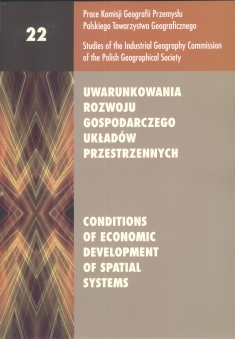Poland in the Rankings of Knowledge Economies
DOI:
https://doi.org/10.24917/20801653.22.2Keywords:
KAM methodology, KEI and KI index, knowledge economy, strategy Europe 2020Abstract
The main aim of this article is to present the position of the Polish economy in comparison to the Member States of the European Union. The evaluation is based on the World Bank’s Knowledge Assessment Methodology (KAM) that produces the Knowledge Economy Index (KEI) - an aggregate index representing a country’s or region’s overall preparedness to compete in the Knowledge Economy (KE). The KEI is based on a simple average of four sub-indexes, which represent the four pillars of the knowledge economy: 1) Economic Incentive and Institutional Regime, 2) Innovation and Technological Adoption, 3) Education and Training, 4) Information and Communications Technologies Infrastructure. The study utilizes the data from 2012. Poland dropped down 3 position to the 38th place since 2000, which is a reflection of the declines in the normalized scores for two indicators. The second part of paper deals with describing steps undertaken by Poland within the Europe 2020 strategy, whose aim is to improve its position and lead to the development of a knowledge- based economy.
Downloads
References
Annual Growth Survey 2013. (2012, 5 październik). Pozyskano z http://ec.europa.eu/europe2020/in- dex_en.htm.
Chen, D.H.C., Dahlman, C.J. (2005). The Knowledge Economy, the KAM Methodology and World Bank Operations. Washington DC: World Bank.
Ciborowski, R., Grabowiecki, J. (2004). Innovation and Technological Competitiveness of Central and East European Countries. W: K. Piech (red.), The Knowledge-Based Economy in Transition Countries: Selected Issues. London: University College London – School of Slavonic and East European Studies, 175–200.
Dahlman, C.J. (1999). The Four Pillars of the Knowledge Economy. Washington: World Bank Institute.
Europe 2020 target. (2012, 10 październik). Pozyskano z http://ec.europa.eu/europe2020/pdf/targets_ en.pdf.
Gierańczyk, W. (2009). Innowacyjność jako główny filar społeczeństwa informacyjnego Europy. Prace Komisji Geografii Przemysłu Polskiego Towarzystwa Geograficznego, 13, 82–94.
Howitt, P. (1996). On Some Problems in Measuring Knowledge Based Growth. W: P. Howitt (red.), The Implications of Knowledge Based Growth for Micro-Economic Policies. Calgary: University of Calgary Press.
Hryniewicz, J.T. (2010). Gospodarka oparta na wiedzy a globalne procesy geopolityczne. Prace Komisji Geografii Przemysłu Polskiego Towarzystwa Geograficznego, 15, 61–68.
Kurek, S. (2010). Przestrzenne zróżnicowanie poziomu rozwoju regionalnego w Unii Europejskiej w świetle wybranych mierników. Prace Komisji Geografii Przemysłu Polskiego Towarzystwa Geograficznego, 16, 87–104.
Lundvall, B., Johnson, B. (1994). The Learning Economy. Journal of Industry Studies, 1 (2).
Machlup, E. (1962). The Production and Distribution of Knowledge in the United States. Princeton New York : Princeton University Press.
Nowak, P. (2012). Poziom innowacyjności polskiej gospodarki na tle krajów UE. Prace Komisji Geografii Przemysłu Polskiego Towarzystwa Geograficznego, 19, 142–152.
Piech, K. (2006). Tempo wzrostu gospodarczego a rozwój gospodarki opartej na wiedzy. W: K. Grysa (red.), Rola informatyki w naukach społecznych. Kielce: Wydawnictwo Wyższej Szkoły Handlowej.
Rachwał, T. (2010). Struktura przestrzenna i działowa przemysłu Polski na tle Unii Europejskiej w dwudziestolecie rozpoczęcie procesów transformacji systemowej. Prace Komisji Geografii Przemysłu Polskiego Towarzystwa Geograficznego, 16, 105–124.
Rachwał, T. (2011). Wpływ kryzysu na zmiany produkcji przemysłowej. Prace Komisji Geografii Przemysłu Polskiego Towarzystwa Geograficznego, 17, 99–113.
Republic of Korea. Transition to a Knowledge-Based Economy. 20Report 20346-KO. (2012, 10 listopad).
Pozyskano z http://www-wds.worldbank.org/servlet/WDSContentServer/ WDSP/IB/ 2000/08/14 /000094946_0007210532051/Rendered/P Skyrme, D.J. (1999). Knowledge Networking, Creating the Collaborative Enterprise. Oxford: Butterworth–Heinemann.
Solow, R. (1957). Technical Change and the Aggregate Production Function. Review of Economics and Statistics, 39, 312–320.
Solska, J. (2012, 20 październik). Ranking społeczeństw Europy – czy da się wycenić kapitał ludzki?.
Pozyskano z http://serwisy.gazetaprawna.pl/edukacja/artykuly/632179,solska_wyksztalceni_pra- cowici_kompetentni_a_dopiero_na_dwudziestym_miejscu_ranking_spoleczenstw_europy.html
Strategia Europa 2020. (2012, 12 wrzesień). Pozyskano z http://www.mg.gov.pl/Bezpieczenstwo+ go- spodarcze/Strategia+Europa+2020
The Knowledge-Based Economy. (1996). Paris: OECD. Pozyskano z http://www.oecd.org/science/ scienceandtechnologypolicy/1913021.pdf
Unijna tablica innowacyjności 2011. (2011, 10 grudzień). Pozyskano z http://ec.europa.eu/enterprise/ policies/innovation/files/ius-2011_en.pdf
Witulska, N. (2003). Zarządzanie wiedzą w aspekcie osiągania przewagi konkurencyjnej. W: K. Piech, G. Szczodrowski (red.), Przemiany i perspektywy polskich przedsiębiorstw w dobie integracji z Unią Europejską. Warszawa: IW, 145–153.
World Development Report (1998/1999), http://web.worldbank.org/WBSITE/ EXTERNAL/ EXTDEC/ EXTRESEARCH/EXTWDRS/0,contentMDK:22293493~pagePK:478093~piPK:477627~the SitePK:477624,00.html#fulltext (dostęp 25.11.2012).
Downloads
Published
How to Cite
Issue
Section
License
Articles are published under the terms of the Creative Commons License (CC BY-ND 4.0; Attribution– NoDerivs).

